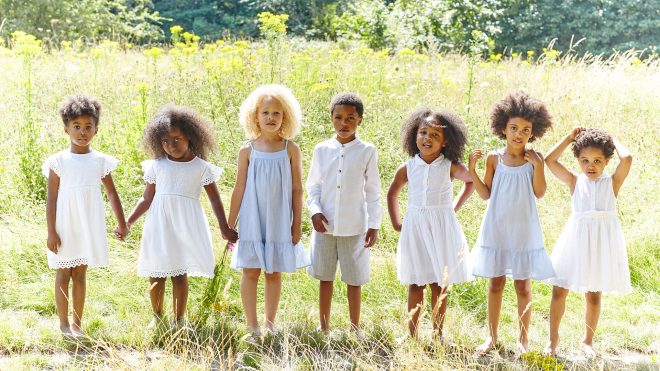Now more than ever, creatives are steering conversations in their chosen direction and publishing content that represents their own experiences – both independent and collective. Between the rise of social media and zine culture, and the shrinking financial barriers in film and TV production, people are finding ways to fill in the gaps where mainstream media and culture have failed them.
This nascent independent publishing scene has no doubt come about because, when it comes to big brand ads or representation on (and off) screen, they’re rarely indicative of real people and real life. It’s something Selma Nicholls came up against when her daughter started questioning her own identity at the mere age of three, having not seen lead characters or kids in ads that resembled her. At the time, she had first started asking for straight hair. “One day, her request changed: she didn’t ask for straight hair, but for white skin. She said she didn’t want to be brown any more,” Nicholls wrote in 2016.
While Nicholls’s daughter was brought up with diversity and inclusivity around her, from the books she read to the toys she played with (“plus size dolls, black dolls, white dolls…”), something was missing. The realisation came when the pair was watching a re-make of Annie together, starring a young black actress, Quvenzhané Wallis, in the place of the red-haired, white Annie from the 1982 original.
“We’re watching this film, and she says, ‘Mummy, Mummy, look at Annie – she’s so beautiful, and she looks like me,’” Nicholls remembers. “I was like, ‘Oh my gosh, that’s it. She needs to see images of herself outside of the home, on stage or on screen.’”
And so Looks Like Me was born. Founded by Nicholls, the casting and talent agency mainly works with children and families (for now), its clients including Nickelodeon, Amazon and Warner Music Group. Nicholls had previously worked in theatre production at London International Festival of Theatre, where she helped to bring diverse artists and lesser known stories to wider audiences.
Top image and this image: Helen Marsden Photography
Since its inception, Looks Like Me has been picked up by the Virgin Start-Up scheme, and is about to embark on a partnership with Getty Images to create a platform promoting female photographers – a move that indicates the agency’s broad scope for the future.
These days, though, Nicholls is still trying to shrug off the misconception that Looks Like Me is a ‘BME agency’. “People feel comfortable when they can put labels on you,” she points out. “Looks Like Me could mean anything. It can mean any cultural group, it can mean any type of background, it can mean any type of ability or disability. It can represent anybody.” The fundamental, underlying aim is to introduce greater diversity to screens while eradicating the sense of tokenism that still pervades mainstream media and advertising.
Inclusive casting has rightly been earning more attention and opening up discourse within the industry in recent years. Photographer and publisher Campbell Addy, for example, has used his influential platform to create casting and modelling agency Nii, which promotes diversity among models for high-fashion clients.
However, even when things seem to be moving in the right direction in terms of who’s in front of the lens, a gaping hole remains behind the scenes. Even if there is a broad range of models involved in a shoot, there are myriad considerations – from lighting to styling and beyond – that end up overlooked if teams aren’t inclusive too.
It’s a concern that hasn’t escaped Nicholls, who also highlights how the dynamic is impacted when teams working on set only involve a narrow set of people. “I am mindful of always working with diverse and inclusive teams of people from all different walks of life, because I just feel it unearths a different type of energy,” she explains, recalling how unnatural sets feel when the talent is diverse but the creatives behind the camera aren’t. Instead, when she creates her own, inclusive sets, it reveals an “interesting tapestry of difference and learning and sharing and exchanging. It evokes a really beautiful energy and so I promote that,” she says.
Helen Marsden Photography
Unfortunately, many agencies and studios still fall back on the tired excuse that they’d relish being more inclusive in their hires but that the right people for the job just aren’t there. “I’m like, ‘No, the talent pool is there – we just have to be open to saying: inclusive talent pool – you are welcome’. They are there,” she reaffirms.
Looks Like Me might only be in its fifth year, but Nicholls has found a perceptible difference in how the industry is operating. “I’ve noticed a huge change in the advertising and media world. I’m not claiming it’s because of me, but I definitely feel I’ve been a stimulus within that movement and change,” she says. “I feel really proud to be part of, or to have entered into an industry that is evolving so well.”
That’s not to say it’s been an easy ride. Between financial restraints that required Nicholls to self-invest heavily, and an industry that’s still relatively slow to adopt change, it’s been tough, but it’s a movement that Nicholls believes in. “It’s really hard being the first at anything I guess.”
lookslikeme.co.ukThe post Looks Like Me is the casting agency striving for inclusivity appeared first on Creative Review.
Looks Like Me is the casting agency striving for inclusivity
By Thomasin Creative News486

